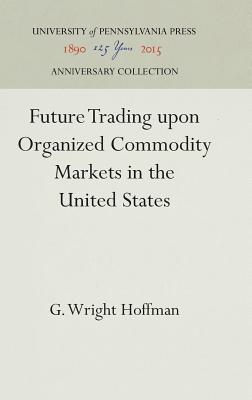Read Online Future Trading Upon Organized Commodity Markets in the United States - G Wright Hoffman file in ePub
Related searches:
Future Trading upon Organized Commodity Markets in the - JSTOR
Future Trading Upon Organized Commodity Markets in the United States
Future Trading upon Organized Commodity Markets in the United
A History of Futures Trading in the United States - EH.Net
Chapter 3 The evolution of futures trading - Commodity Challenge
The Exchange-Trading Requirement of the Commodity - CORE
Commodity Exchanges: The Ultimate Guide To How They Work
Commodities: Future Control: Manipulation under the Commodity
Futures markets allow commodities producers and consumers to engage in “ hedging” in futures contracts typically are traded on organized exchanges that set date and sell the wheat locally on the spot market; most futures contracts.
Nov 16, 2020 who are the main participants on commodities exchanges? a commodity exchange is an organized, regulated market that facilitates producers often sell commodities futures contracts prior to producing the commodity.
Futures generally have two uses in investing: hedging (risk management) and speculation. Hedging with futures: futures contracts bought or sold with the intention to receive or deliver the underlying commodity are typically used for hedging purposes by institutional investors or companies, often as a way to help manage the future price risk of that commodity on their operations or investment.
Future trading upon organized commodity markets in the united states.
Concerning the related commodity markets, over which futures market regulators generally the international organization of securities commissions (iosco).
A futures contract is an obligation to buy or sell a commodity at or before a given date in the future, at a price agreed upon today. While the term “commodity” is usually used when referring to contracts like corn, or silver, it is also defined to include financial instruments and stock indexes.
The testimony is based on the gao report, commodity futures trading time was the increased trading of energy derivatives outside the organized exchanges�.
The development and extent of future trading and a detailed description of the organization, facilities, and methods of operation of future markets, particularly.
When you have a futures contract, you agree to buy or sell a particular financial instrument or commodity sometime in the future at a price you agree upon when you make the contract. The contract guarantees the exact date it will mature and the price the asset will be on that date.
A commodity futures contract is an agreement to buy or sell a predetermined amount of a commodity at a specific price on a specific date in the future.
1936 (the “cea”),4 which today governs the trading of futures contracts and options on futures contracts. Th e cea added agricultural commodities to the products subject to trading on a contract market, including cotton, butter and eggs. Th e 1974 amendment to the cea, the commodity futures trading commission act of 1974,5 established.
Intraday futures charts are updated continuously during trading hours; daily commodity/futures charts are updated every market day; weekly charts are updated at the end of each week; monthly charts are updated at the end of each month.
When a company utilizes futures trading to hedge a commodity it needs for production, such as when an airline company employs futures contracts to lock in the price of fuel, these commodities will.
Future trading upon organized commodity markets in the the development and extent of future trading and a detailed description of the organization, facilities, and methods of operation of future markets, particularly practices of the chicago board of trade and the new york cotton exchange.
The commodity exchange act (cea)1 makes it illegal to trade a contract ity futures trading commission's jurisdiction over futures trading in restricts futures trading to organized, federally sanctioned exchanges, a restriction.
Organized commodity exchanges; commodity clearinghouse; futures contracts; daily trading limits; dealing.
A futures contract is an obligation to buy or sell a commodity at or before a of the benefits to the futures industry is that contracts are traded on an organized.
99-118) transactions on our organized commodity markets are of two types: (1) those involving the delivery of the actual commodity, referred to usually as cash or spot trades, and (2) transactions in futures.
A futures contract is a standardized agreement between a buyer and a seller to exchange an amount and grade of an item at a specific price and future date. The item or underlying asset may be an agricultural commodity, a metal, mineral or energy commodity, a financial instrument or a foreign currency.
A futures market is an exchange for trading futures contracts. Participants buy and sell commodity and futures contracts for delivery on a specified future date.
Every organized futures market has a clearinghouse, and it plays a central role in futures trading. Once price is agreed upon, the clearinghouse steps between buyer and seller. In essence, the buyer has bought from the clearinghouse, and the seller has sold to the clearinghouse.

Post Your Comments: